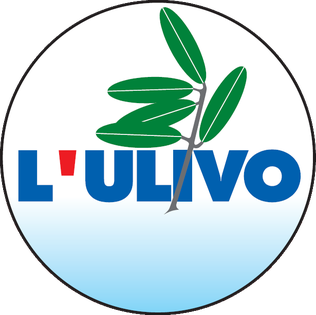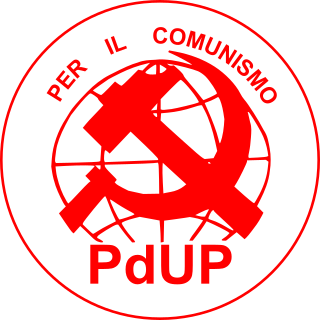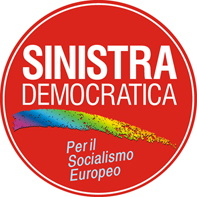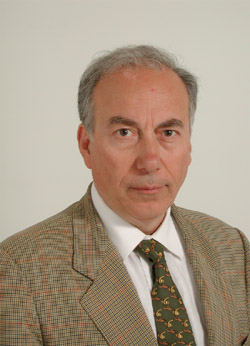
The Italian Communist Party was a communist and democratic socialist political party in Italy. It was founded in Livorno as the Communist Party of Italy on 21 January 1921, when it seceded from the Italian Socialist Party (PSI), under the leadership of Amadeo Bordiga, Antonio Gramsci, and Nicola Bombacci. Outlawed during the Italian fascist regime, the party continued to operate underground and played a major role in the Italian resistance movement. The party's peaceful and national road to socialism, or the Italian road to socialism, the realisation of the communist project through democracy, repudiating the use of violence and applying the Constitution of Italy in all its parts, a strategy inaugurated under Palmiro Togliatti but that some date back to Gramsci, would become the leitmotif of the party's history.

The Democrats of the Left was a social-democratic political party in Italy. Positioned on the centre-left, the DS, successor of the Democratic Party of the Left (PDS) and the Italian Communist Party, was formed in 1998 upon the merger of the PDS with several minor parties. A member of The Olive Tree coalition, the DS was successively led by Massimo D'Alema, Walter Veltroni, and Piero Fassino, and merged with Democracy is Freedom – The Daisy and a number of minor centre-left parties to form the Democratic Party in October 2007.

The Olive Tree was a denomination used for several successive centre-left political and electoral alliances of Italian political parties from 1995 to 2007.

The Party of Italian Communists was a communist party in Italy established in October 1998 by splinters from the Communist Refoundation Party (PRC). The split was led by Armando Cossutta, founder and early leader of the PRC, who opposed Fausto Bertinotti's leadership and, especially, his decision to withdraw support from Romano Prodi's first cabinet. In December 2014, the party was transformed into the Communist Party of Italy (PCd'I), which would later evolve into the new version of the Italian Communist Party (PCI).

The Democratic Party of the Left was a democratic-socialist and social-democratic political party in Italy. Founded in February 1991 as the post-communist evolution of the Italian Communist Party, the party was the largest in the Alliance of Progressives and The Olive Tree coalitions. In February 1998, the party merged with minor parties to form Democrats of the Left. At its peak in 1991, the party had a membership of 989,708; by 1998, it was reduced to 613,412.
The Republican Left was a social-liberal political party in Italy.

Migliorismo was a tendency within the Italian Communist Party (PCI). Its founder and first leader was Giorgio Amendola, and it counted among its members the likes of Gerardo Chiaromonte, Emanuele Macaluso, and Giorgio Napolitano. Napolitano went on to become the longest-serving and longest-lived president in the history of the Italian Republic, as well as the first president of Italy to have been a former PCI member. Due to the relatively moderate and reformist views of its adherents, it was referred to as the right-wing of the PCI. Apart from Amendola, Chiaromonte, Macaluso, and Napolitano, other notable miglioristi included Nilde Iotti, Giancarlo Pajetta, and Luciano Lama. After the death of Amendola in 1980, Napolitano became its main leader.

The Proletarian Unity Party was a far-left political party in Italy.

The 1992 Italian general election was held on 5 and 6 April 1992. They were the first without the traditionally second most important political force in Italian politics, the Italian Communist Party (PCI), which had been disbanded in 1991. Most of its members split between the more democratic socialist-oriented Democratic Party of the Left (PDS), while a minority who did not want to renounce the communist tradition became the Communist Refoundation Party (PRC); between them, they gained around 4% less than what the already declining PCI had obtained in the 1987 Italian general election, despite PRC absorbing the disbanded Proletarian Democracy (DP).

The first Prodi government was the 53rd government of Italy. It held office from 18 May 1996 until 21 October 1998.
The Labour Federation was a social-democratic political party in Italy. The party's leader and founder was Valdo Spini.

The Alliance of Progressives was a left-wing political alliance of parties in Italy formed in 1994, with relevant predecessors at local level in 1993. The leader of the alliance was Achille Occhetto. The alliance was a predecessor of the modern-day centre-left coalition.

Democratic Left, whose complete name was Democratic Left. For European Socialism, was a democratic-socialist political party in Italy.

Massimo D'Alema is an Italian politician and journalist who was the 53rd prime minister of Italy from 1998 to 2000. He was Deputy Prime Minister of Italy and Italian Minister of Foreign Affairs from 2006 to 2008. D'Alema also served for a time as national secretary of the Democratic Party of the Left (PDS). Earlier in his career, D'Alema was a member of the Italian Communist Party (PCI) and was the first former Communist party member to become prime minister of a NATO country and the only former PCI prime minister of Italy. Due to his first name and for his dominant position in the left-wing coalitions during the Second Republic, he is referred to as Leader Maximo. He is also the author of several books.

Vittorio Foa was an Italian politician, trade unionist, journalist, and writer.

Lucio Magri was an Italian journalist and politician.

The Communist Refoundation Party is a communist political party in Italy that emerged from a split of the Italian Communist Party (PCI) in 1991. The party's secretary is Maurizio Acerbo, who replaced Paolo Ferrero in 2017. Armando Cossutta was the party's founder, while Fausto Bertinotti its longest-serving leader (1994–2008). The latter transformed the PRC from a traditional communist party into a collection of radical social movements.
The centre-left coalition is a political alliance of political parties in Italy active under several forms and names since 1995, when The Olive Tree was formed under the leadership of Romano Prodi. The centre-left coalition has ruled the country for more than fifteen years between 1996 and 2021; to do so, it had mostly to rely on a big tent that went from the more radical left-wing, which had more weight between 1996 and 2008, to the political centre, which had more weight during the 2010s, and its main parties were also part of grand coalitions and national unity governments.

Emanuele Macaluso was an Italian trade unionist, politician, and journalist.

Famiano Crucianelli is an Italian politician and surgeon.


















